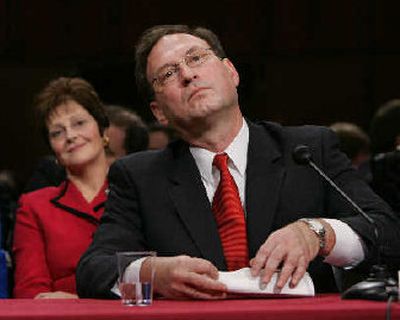Alito holds senators rapt

WASHINGTON – Supreme Court nominee Samuel Alito told senators Monday that “a judge can’t have any agenda” and pledged not to bring one to the high court. But skeptical Democrats are promising to test him this week with tough questions on abortion, civil rights and presidential power.
Alito’s confirmation hearings got under way before the Senate Judiciary Committee with a traditional endurance test. With his wife, children and in-laws seated behind him, Alito sat through more than three hours of opening statements from the panel’s 18 members before he could respond.
When he did, it was with self-deprecating humor, joking that he sympathized with committee aides who had combed through the hundreds of opinions he has written as a judge on the Philadelphia-based 3rd U.S. Circuit Court of Appeals. “That may have constituted cruel and unusual punishment,” he said.
The senators’ comments indicated that the debate over President Bush’s pick to succeed retiring Justice Sandra Day O’Connor – a swing vote on abortion, affirmative action and other controversies – is likely to be sharply partisan.
Republicans welcomed Alito as an “exceptional and honest judge devoted to the rule of law,” by Sen. Charles Grassley, R-Iowa. Democrats, though, were critical. “You seem to have been picked to placate the extreme right wing,” said Sen. Charles Schumer, D-N.Y.
Alito, 55, got a politically important endorsement from former New Jersey governor Christine Todd Whitman, a Republican who supports abortion rights. “I have every confidence he will be a balanced, fair and thoughtful justice,” Whitman said as she introduced the New Jersey native to the panel.
Though she did not mention abortion in her testimony, Whitman told reporters that Alito proved his impartiality to her when he ruled in 2000 against a New Jersey anti-abortion measure. “I know that personally he would have liked that bill to become law,” said Whitman, who opposed the legislation.
That may not reassure Alito’s critics who worry that the conservative jurist could provide a crucial vote to curtail “Roe v. Wade,” the 1973 Supreme Court decision that made abortion legal nationwide. Alito’s ruling in the New Jersey case cited a Supreme Court ruling in a similar case from Nebraska. “Our responsibility as a lower court is to follow and apply controlling Supreme Court precedent,” he wrote.
Sen. Dianne Feinstein, D-Calif., an abortion-rights supporter and the only woman on the Judiciary committee, pointed out that Alito would not be similarly constrained if he becomes a member of the high court. She said Alito’s opinions on abortion “raise questions about how you might rule if not bound by precedent.”
Alito’s hearings are being conducted against the backdrop of a debate over presidential powers during a time of war and the revelation of Bush’s decision to eavesdrop without court warrants on phone conversations between terrorism suspects overseas and people in the United States. “We need judges who will stand up and tell the executive branch when it is wrong,” said Sen. Russ Feingold, D-Wis.
Alito portrayed himself as the product of a modest Italian-American family that had once faced discrimination. He said his father had trouble getting a job as a schoolteacher because of his ethnic background.
The judge cut a different profile before the committee than the smooth John Roberts, whom the Senate confirmed in September as chief justice of the United States. Alito’s suit and hair seemed a bit rumpled. He sometimes paused before speaking to take a long drink of water. But if he was not slick, senators were still rapt.
Alito paid tribute to the woman he has been tapped to succeed, saying he is humbled and honored to be nominated to the seat held by O’Connor, the court’s first woman member whose significance was frequently hailed by Democrats on the committee.
“Her legacy is one of fairness that I want to see preserved,” said Vermont Sen. Patrick Leahy, the top Democrat. Schumer questioned whether Alito could fill O’Connor’s “special shoes.”
But Judiciary Committee Chairman Arlen Specter, a Pennsylvania Republican who backs abortion rights, urged panel members not to rush to judgment. “A number of the opening statements by the Democrats sounded more like indictments,” he said. “Let’s give this fellow a chance.”